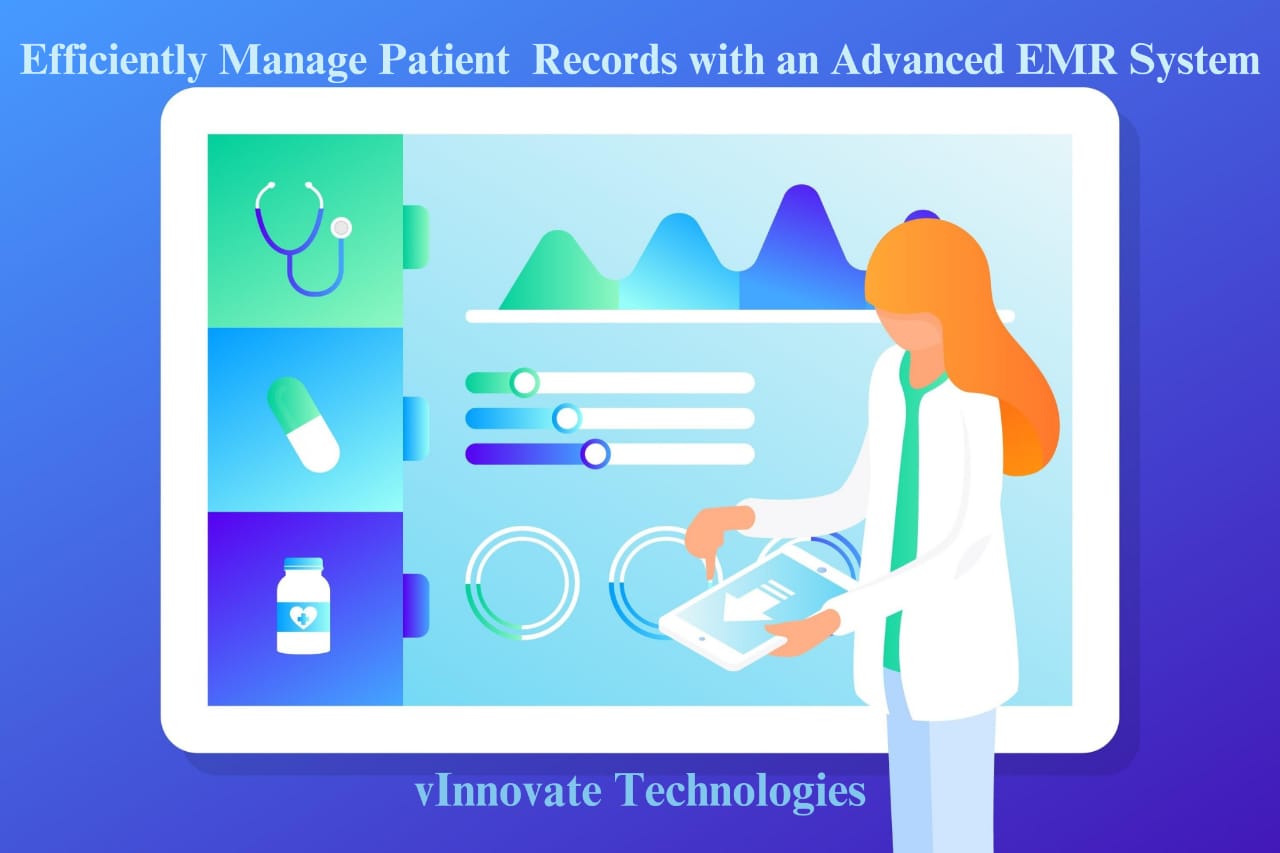Efficiently Manage Patient Records with an Advanced EMR System
- PUBLISHED
- August 27, 2024
- CATEGORY
- Digitization
- CLIENT
- vInnovate Technologies

Efficiently Manage Patient Records with an Advanced EMR System
Discover the benefits of an advanced Electronic Medical Records (EMR) system in managing patient records efficiently. Learn how it enhances data security, interoperability, and clinical decision support while improving productivity, quality of care, and re
In the fast-paced environment of healthcare, efficient management of patient records is crucial. With the rising demands for accuracy, accessibility, and security in patient data management, traditional paper records are becoming obsolete. Enter the Advanced Electronic Medical Records (EMR) System—a digital solution designed to revolutionize how patient information is handled. This blog will explore the key benefits of an advanced EMR system and how it can transform the efficiency of managing patient records.
The Evolution of Patient Records
Historically, patient records have been maintained on paper, which posed numerous challenges including illegibility, the risk of loss or damage, and limited accessibility. The transition to digital records started with basic EMR systems, which primarily digitized handwritten notes. However, advanced EMR systems have taken this a step further, integrating various functionalities that streamline workflows and enhance patient care.
Key Features of an Advanced EMR System
Centralized Data Storage
Advanced EMR systems provide a centralized repository for all patient information, including medical history, lab results, imaging, and treatment plans. This centralized storage ensures that all relevant information is easily accessible to healthcare providers, facilitating better decision-making and continuity of care
Interoperability
Modern EMR systems are designed to communicate seamlessly with other healthcare systems, such as laboratory information systems (LIS), pharmacy management systems, and other healthcare providers' EMRs. This interoperability ensures that patient data can be shared securely and efficiently across different healthcare settings, promoting coordinated care.
Enhanced Data Security
Protecting patient information is paramount. Advanced EMR systems employ robust security measures, including encryption, access controls, and audit trails, to safeguard sensitive patient data against unauthorized access and breaches
Automated Workflow
Automation is a significant benefit of advanced EMR systems. From appointment scheduling and reminders to electronic prescriptions and billing, automation reduces the administrative burden on healthcare staff, allowing them to focus more on patient care.
Clinical Decision Support
Advanced EMR systems come with integrated clinical decision support tools that provide real-time alerts and reminders, assist in diagnosis, and suggest treatment options based on the latest medical guidelines. This feature enhances the quality of care by supporting healthcare providers with evidence-based decision-making.
Patient Engagement
Many advanced EMR systems include patient portals that allow patients to access their medical records, schedule appointments, request prescription refills, and communicate with their healthcare providers. This increased engagement empowers patients to take an active role in their healthcare management.
Benefits of Using an Advanced EMR System
Improved Efficiency and Productivity
By automating routine tasks and streamlining workflows, advanced EMR systems significantly enhance the efficiency and productivity of healthcare providers. This leads to reduced wait times, faster diagnosis and treatment, and more time for patient interaction.
Enhanced Quality of Care
With comprehensive patient information readily available, healthcare providers can make more informed decisions, leading to better patient outcomes. Clinical decision support tools further enhance the quality of care by providing timely, evidence-based recommendations.
Cost Savings
Although the initial investment in an advanced EMR system can be substantial, the long-term cost savings are significant. Reduced paperwork, fewer transcription errors, and improved billing processes contribute to lower operational costs.
Regulatory Compliance
Advanced EMR systems are designed to comply with healthcare regulations and standards, such as HIPAA (Health Insurance Portability and Accountability Act) in the United States. This ensures that patient records are managed in accordance with legal requirements, reducing the risk of compliance-related penalties.
Data-Driven Insights
The ability to collect and analyze vast amounts of patient data enables healthcare organizations to gain valuable insights into population health trends, treatment effectiveness, and operational efficiency. These insights can drive improvements in both clinical practice and business operations.
Conclusion
The transition to an advanced EMR system is a pivotal step for any healthcare organization aiming to enhance the efficiency and quality of patient record management. With features like centralized data storage, interoperability, enhanced security, and automated workflows, advanced EMR systems provide a comprehensive solution to the challenges of traditional record-keeping methods. By adopting these systems, healthcare providers can improve patient care, streamline operations, and ultimately, foster a more effective and patient-centered healthcare environment.
Investing in an advanced EMR system is not just about staying current with technology; it’s about fundamentally transforming how patient information is managed, ensuring that healthcare providers are equipped to deliver the best possible care in an increasingly digital world.

